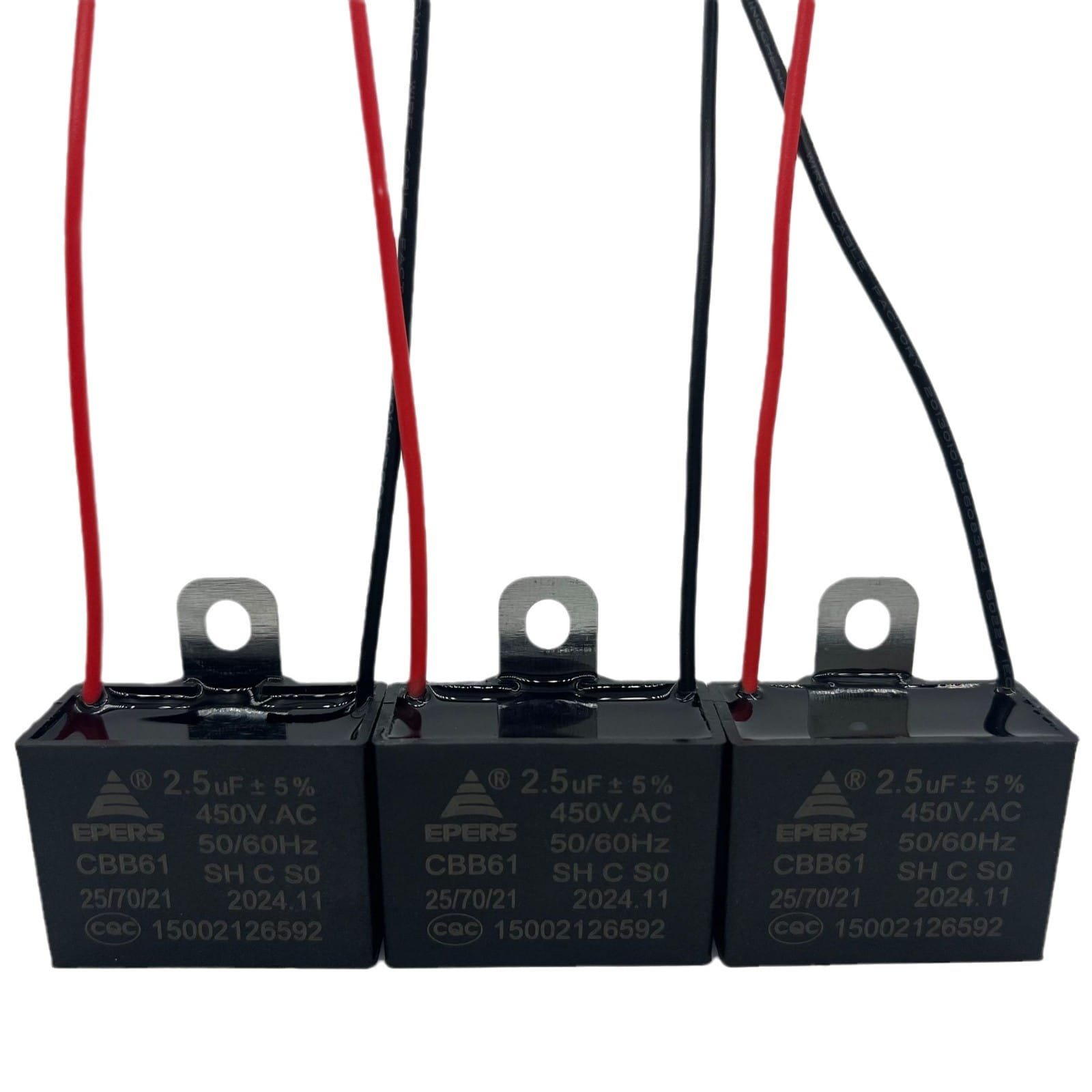In the world of motors, the Motor Operation Capacitor is small but plays a key role. Imagine that the motor is the power heart of a complex machine, and the Motor Operation Capacitor is the key pacemaker that ensures the stable beating of this heart. It allows the motor to start smoothly and run continuously and stably. Just like the engine of a car needs a precise ignition system, the motor cannot do without the support of the Motor Operation Capacitor. Without it, the motor may “hesitate” when starting, “stumble” when running, or even “strike” directly. Next, let’s explore the mystery of this magical little component in depth.
In-depth understanding of the Motor Operation Capacitor
- The basic structure is revealed
Although the Motor Operation Capacitor is small in size, its internal structure is “complete”. It is mainly composed of two key parts: electrodes and dielectrics. Electrodes are usually made of metal materials, such as aluminum foil, which has good conductivity. It acts like a “charge carrier” and is responsible for storing and conducting charges. The dielectric is an insulating material sandwiched between two electrodes. Common ones include plastic film and ceramics. Although it is not conductive, it is the key to improving the performance of capacitors. For example, the electrodes are like two containers for water, and the dielectric is like a partition between the containers. The material and thickness of this partition determine how much “electric water” the capacitor can store, that is, the size of the capacitance. When the capacitor is connected to the circuit, the electrodes start to work, the charges gather on the electrodes, and the dielectric stabilizes the electric field in the middle to prevent the charges from “running around”, ensuring that the capacitor operates efficiently and stably. - In-depth analysis of the working principle
The working principle of the Motor Operation Capacitor is essentially closely related to the movement of charges and the role of the electric field. From the perspective of charge movement, when the capacitor is connected to the AC circuit, under the action of voltage, the charges begin to gather on the electrodes, just like filling an empty bucket with water. As the charge continues to accumulate, the voltage across the capacitor gradually increases. This process is charging. When the voltage direction changes, the capacitor begins to discharge, and the charge flows out of the electrodes, just like the water in the bucket is poured out. When the motor is running, the capacitor is constantly charged and discharged, providing additional current for the motor, helping the motor to start smoothly and run stably. From the perspective of the electric field principle, the dielectric forms an electric field between the electrodes, and this electric field can store energy. When charging, the electric energy is converted into electric field energy and stored in the capacitor; when discharging, the electric field energy is converted into electric energy and released to replenish the energy for the motor, just like an energy “power bank”, providing timely support when the motor needs it, ensuring the continuous and stable operation of the motor.

Wide Application of Motor Operation Capacitor
- Important Role in the Industrial Field
In the industrial field, the Motor Operation Capacitor can be called the “behind-the-scenes hero” of the stable operation of motor equipment. Take the motor of the factory production line as an example. In an automobile manufacturing factory with a high degree of automation, the motor of the production line needs to be started, stopped, and adjusted frequently to meet the needs of different production links. At this time, the Motor Operation Capacitor plays a key role. It helps the motor start smoothly, avoids the impact of excessive starting current on the equipment and the power grid, and ensures that the production line can run efficiently and uninterruptedly 24 hours a day. Once the capacitor fails, the production line may come to a standstill, causing huge economic losses. Another example is a large ventilator. In coal mines, subways, and other places, large ventilators are responsible for ventilation and air exchange to ensure the safety of personnel and the normal operation of equipment. The Motor Operation Capacitor allows the ventilator to operate stably, continuously deliver fresh air to the underground or underground space, and discharge harmful gases. If the capacitor of the ventilator fails and the ventilation is not smooth, it will cause a serious safety accident. - Hidden Figures in Daily Life
In daily life, the Motor Operation Capacitor is also everywhere, silently improving the performance of home appliances. In air conditioners, it is like a “caring assistant”. In summer, when you can’t wait to turn on the air conditioner when you get home and want to enjoy the coolness, a Motor Operation Capacitor helps the air conditioner compressor start smoothly and cool quickly. It can also improve the operating efficiency of the air conditioner, reduce energy consumption, and help you save on electricity bills. If there is a problem with the capacitor, the air conditioner may be difficult to start, the cooling effect will be greatly reduced, and an abnormal noise will be emitted. Washing machines are also inseparable from it. It can enable the washing machine motor to generate a rotating magnetic field to achieve the washing and dehydration of clothes. With it, the motor can easily reverse forward and reverse, complete various washing programs, and make washing efficient and convenient. Without it, the washing machine may not work properly, and the clothes will not be washed clean and dehydrated thoroughly.

Common problems and solutions that cannot be ignored
- Know all types of faults
During the use of the Motor Operation Capacitor, some common faults cannot be ignored. Oil seepage and leakage are relatively common problems. Lifting the porcelain sleeve during transportation causes cracks in the flange welding, or tightening the screws too hard during wiring, damaging the porcelain sleeve welding, and product manufacturing defects, etc., may cause oil seepage and leakage. Drastic temperature changes and increased internal pressure during operation will aggravate the seepage and leakage of oil; long-term lack of maintenance, peeling of the shell paint, and rusting of the iron sheet are also some of the reasons for seepage and leakage. The shell deformation also needs to be vigilant. When the internal dielectric of the capacitor is freed under the action of the high-voltage electric field and decomposes into gas, or some components are broken down and the poles are discharged to the ground of the shell, the dielectric will precipitate gas, resulting in increased internal pressure, which will cause the shell to expand and deform. Explosion is the most serious fault. The breakdown of internal components is mostly caused by poor manufacturing process; the insulation of the outer shell is damaged, such as burrs and bends on the edge of the lead wire, which produces corona, and improper welding during the capping damages the internal insulation; poor sealing and oil leakage, moisture entering, and the oil level dropping cause pole-to-shell discharge or component breakdown; bulging and internal free, corona, breakdown discharge, etc. cause insulation aging and decomposition to produce gas, forming a vicious cycle; live closing, the voltage polarity at the moment of closing is opposite to the residual charge polarity of the capacitor, which may cause an explosion. In addition, temperature rise is also a common fault. Long-term overvoltage operation, the high-order harmonics generated by the nearby rectifier device flowing into the capacitor to cause overcurrent, and the dielectric aging after long-term operation, and the dielectric loss tangent value continues to increase, which may cause the capacitor temperature to rise. - Response strategy disclosure
For these faults, we have a series of effective response strategies. For the problem of oil seepage and leakage, use a separate soft wire to connect to the busbar during installation to avoid damage to the casing caused by hard busbar connection; place it upright during transportation, handle it with care, and do not handle the casing. Pay attention to the tightness of the wire when wiring and protect the casing; if there is oil seepage at the weld of the box shell and casing, you can first remove the rust, then repair it with tin solder, and paint it after repair. If the seepage and leakage are serious, the capacitor needs to be replaced. If the shell is deformed, the operating capacitor group should be inspected regularly. If the expansion is serious, stop using it immediately, find out the cause, and replace it; if the expansion is not serious, take ventilation measures and strengthen operation inspection. To prevent an explosion, it is necessary to strengthen the inspection during operation, install protective devices, and remove the capacitor that may explode in time; if you hear the “cuckoo” sound from the capacitor during operation, stop running immediately. In the face of the problem of rising temperature, it is necessary to monitor and control the ambient temperature. When the temperature is too high, you can strengthen ventilation and heat dissipation, such as turning on the exhaust fan; avoid long-term overvoltage and overcurrent operation of the capacitor, carry out harmonic control, and prevent harmonic influence; for aging capacitors, replace them in time.

Future Outlook: Development Trends and Prospects
With the rapid development of science and technology, the Motor Operation Capacitor is also evolving, showing an exciting development trend. In terms of performance improvement, R&D personnel are working to improve the capacitance accuracy and stability of capacitors so that they can operate accurately and efficiently in different environments. In the future, the Motor Operation Capacitor is expected to achieve higher energy density, store more energy in a smaller volume, provide more powerful power support for motors, and meet the needs of fields such as electric vehicles and aerospace that have extremely high requirements for motor performance.
Miniaturization is also an important development direction. Nowadays, electronic devices and motor systems are increasingly pursuing miniaturization and light weight, and the Motor Operation Capacitor also follows this trend. Through innovative design and advanced manufacturing processes, future capacitors will be greatly reduced in size while maintaining or even improving performance and can be easily integrated into various compact motor systems, such as smart home devices, wearable electronic products, etc., to provide support for the further development of these fields.
The application of new materials will bring a qualitative leap to the Motor Operation Capacitor. Scientists are constantly exploring new dielectric materials and electrode materials, such as nanomaterials with high dielectric constants and new ceramic materials. These new materials can not only improve the performance of capacitors but also give them some special functions, such as better high temperature resistance, high voltage resistance, and stronger anti-electromagnetic interference ability, so that the Motor Operation Capacitor can operate stably in more complex and harsh environments.
From the perspective of market prospects, with the continuous improvement of the degree of industrial automation around the world and the vigorous development of industries such as new energy vehicles and smart homes, the demand for motors continues to grow, which undoubtedly creates a broad market space for Motor Operation capacitors. In the future, Motor operation capacitors will emerge in more fields and become a key force in promoting technological progress and product upgrades in various industries. It will continue to play its indispensable role and help science and technology development to a new height.






